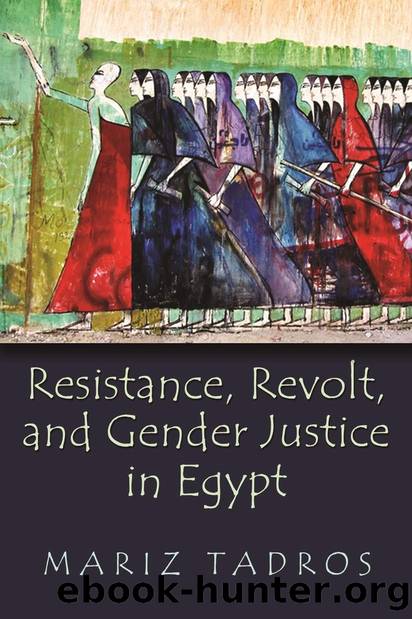Resistance, Revolt, and Gender Justice in Egypt by Mariz Tadros

Author:Mariz Tadros
Language: eng
Format: mobi
Tags: Women's Studies, Social Science
ISBN: 9780815634614
Publisher: Syracuse University Press
Published: 2016-05-17T21:00:00+00:00
7
Whose Democracy Wish list(s)?
I
n June 2011, four months after the ousting of President Mubarak, the euphoria around Egyptâs democratic takeoff was at its apex. UN Women, together with the Institute of Democracy and Electoral Assistance (IDEA) and Pathways of Womenâs Empowerment, hosted a major conference on women and democratization at the five-star Marriott Hotel in Cairo. The focus was how to ensure gender issues were integrated in Egyptâs transition and how to learn from other countriesâ experiences of incorporating gender equality in their democratization processes. Michelle Bachelet, speaking in Cairo, shared reflections from the Chilean experience and emphasized the importance of womenâs empowerment being at the heart of any democratization. She highlighted that âit is crucial to understand that the processes of social struggle and the transition to democracy are unique moments for mending broken ties with the community, shaping institutions, and thinking about the country in the coming decadesâ (Bachelet 2011).
In the same conference, and during the many conferences that followed in the months after the ousting of Mubarak, invited participants issued recommendations for how Egypt should democratize. But while people gathered in the Marriott Hotel to learn about what must be done to engender Egyptâs democratic transition, the situation outside the hotel was not very promising. In March 2013, members of the army police had sexually violated women who were peacefully protesting in Tahrir Square (see chapter 6 for more details on the virginity test lawsuit). A UN staff member blew the whistle on the SCAF and was killed shortly thereafter in broad daylight, in what was believed to be an assassination. On February 15, 2011, Mohamed Tantawy (representing the SCAF) announced
178
the formation of a new committee tasked with amending the constitution. The committee was headed by Tarek el Bishri, a former head of Conseil dâEtat, and comprised another seven members: Atef el Banna, Hassanein Abd el Al, Mohamed Bahi, Sobhi Saleh, Maher Sami, Hassan Badrawi, and moderator Hassan Begato. The committee members were all judges and professors of law except one participant, a Muslim Brotherhood lawyer. There was not a single woman on the committee despite the fact that Tahany el Gebaly was the deputy head of the Supreme Constitutional Court and in spite of the large cohort of distinguished women professors of law in Egyptian universities.
A transitional government was appointed with minimal representation of women. There were rumors that Essam Sharaf, who presided over Egypt as prime minister from March 3 to November 22, 2011, had pledged to establish a womenâs ministryâan idea that once again did not materialize. The political situation deteriorated even further as youth revolutionary forces battled the army, accusing it of usurping power and encroaching on civil liberties. The state-owned and affiliated media and press began a vilification campaign against the youth revolutionaries (Amar 2013). The Islamists also contributed to the demonization of the revolutionaries, portraying them as ânot real menâ and agents of the West. As for women, the image of the emancipated woman camping in Tahrir Square began to be
Download
This site does not store any files on its server. We only index and link to content provided by other sites. Please contact the content providers to delete copyright contents if any and email us, we'll remove relevant links or contents immediately.
| Africa | Americas |
| Arctic & Antarctica | Asia |
| Australia & Oceania | Europe |
| Middle East | Russia |
| United States | World |
| Ancient Civilizations | Military |
| Historical Study & Educational Resources |
Never by Ken Follett(2879)
The Man Who Died Twice by Richard Osman(2297)
Machine Learning at Scale with H2O by Gregory Keys | David Whiting(2287)
Fairy Tale by Stephen King(2068)
Will by Will Smith(2041)
Rationality by Steven Pinker(1764)
The Dawn of Everything: A New History of Humanity by David Graeber & David Wengrow(1570)
The Dark Hours by Michael Connelly(1569)
Principles for Dealing With the Changing World Order: Why Nations Succeed and Fail by Ray Dalio(1373)
Friends, Lovers, and the Big Terrible Thing by Matthew Perry(1327)
A Short History of War by Jeremy Black(1299)
HBR's 10 Must Reads 2022 by Harvard Business Review(1255)
Go Tell the Bees That I Am Gone by Diana Gabaldon(1234)
Can't Hurt Me: Master Your Mind and Defy the Odds - Clean Edition by David Goggins(1227)
515945210 by Unknown(1207)
Fear No Evil by James Patterson(1108)
443319537 by Unknown(1072)
Works by Richard Wright(1018)
Going There by Katie Couric(991)
